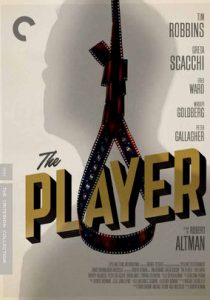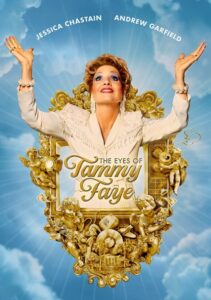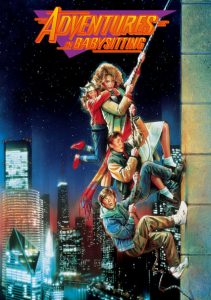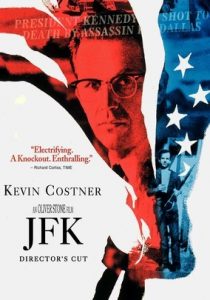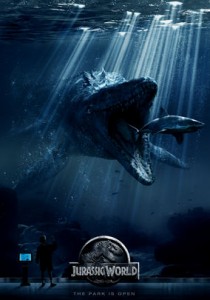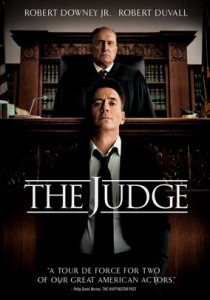Chained-2012
Director Jennifer Lynch
Starring Vincent D’Onofrio
Scott’s Review #627
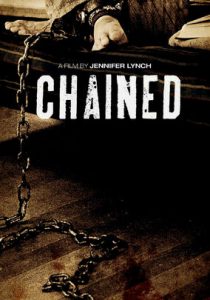
Reviewed March 24, 2017
Grade: B-
Chained is a 2012 independent horror film directed by Jennifer Lynch, who is the daughter of the brilliant film and television director, David Lynch.
His influence is readily felt throughout.
The film is an exercise in cerebral, psychological horror, and is quite mesmerizing for most of the experience. The ending, however, is the pits and takes away from the enjoyment of the rest of the film in its asinine, quickly wrapped-up, conclusion.
The film is set in an unknown area- all the audience knows is a decrepit, isolated, cabin in the middle of nowhere and that the shack exists in somewhat proximity to a college town.
Since the film is shot in Canada that is a good enough locale for me to accept.
One day a seemingly happy husband drops off his wife and nine-year-old son at the movies but implores them to take a taxi home as the bus is too dangerous. When they heed his advice, they are accosted by a deranged serial killer, Bob (D’Onofrio), who drives a cab and whisks them away to his remote home.
After he kills the mother, he makes the son, whom he re-names Rabbit, his slave, reducing him to household chores and a somewhat accomplice to the subsequent victims he brings home.
As the years pass and Bob continues to kill, he is determined to have, a now mature, Rabbit, follow in his footsteps.
A large chunk of Chained (and the film is aptly named because Bob commonly keeps Rabbit chained) takes place in Bob’s lonely home and Bob and Rabbit are all each other have for support. Bob presumably earns a living by stealing the cash his victims carry.
Many scenes of a binding nature, albeit perverse, are featured as the two dole away the time between Bob’s kills, almost like a father and son.
Jennifer Lynch wisely moves the film at a slow pace for appropriate build-up.
Bob’s psychologically troubled childhood is told through flashbacks as he is victimized by his abusive father and forced to have sex with his mother, who blames him rather than her husband.
As a result, Bob hates women, and lures victim after victim into his cab and then slices and dices them back at his home.
Bob is sympathetic, like a wounded bird, and whether he rapes the victims before killing them is unclear, as much happens off-screen.
The cabin is purposely suffocating and when Bob teaches Rabbit intellectual facts and encourages him to read and study to become smart, it is a bonding experience.
Slowly, Bob trusts Rabbit more and more.
When Bob makes Rabbit pick out a young girl in a school yearbook to kill, the film kicks into high gear. Suddenly, it becomes vague whether Rabbit is loyal to Bob or still determined to escape. Will he help his intended victim instead of killing her?
David Lynch’s imprint is blatant in both the pacing of the film and more specifically in the low hum musical score, common in his films.
Daughter Jennifer knows her father’s techniques as they continually come into play. A nice homage to Mulholland Drive (1992) appears when a sweet older couple rides in the back of Bob’s cab, reminiscent of the older couple featured in Mulholland Drive.
The gloomy ambiance is highly effective in Chained and the relationship between Bob and Rabbit, not sexual or overly violent, becomes rather sweet in some moments.
The rushed conclusion of the film is disastrous and Lynch’s attempt at a twist goes haywire in the “makes sense” department.
After a compelling fight scene with Bob, Rabbit finally kills him, escapes his clutches, and returns to his father’s open arms (now newly re-married with another son) only to reveal to his father that he knows he orchestrated Rabbit and his mom’s abduction years ago and that Bob is Rabbit’s uncle!
To matters even more confusing, after a dramatic event, Rabbit is sent away yet again and returns to the cabin as his only safe place.
This final act is a real dog, makes little sense, and is tough to digest.
I will give some liberties to 2012’s Chained since the director is spawned from the great David Lynch and the mood and several characteristics mirror his work, but still with her unique vision an obvious characteristic.
Most of the film is a solid effort, but due to the ending of the film being such a letdown, the body of work seems incomplete.
